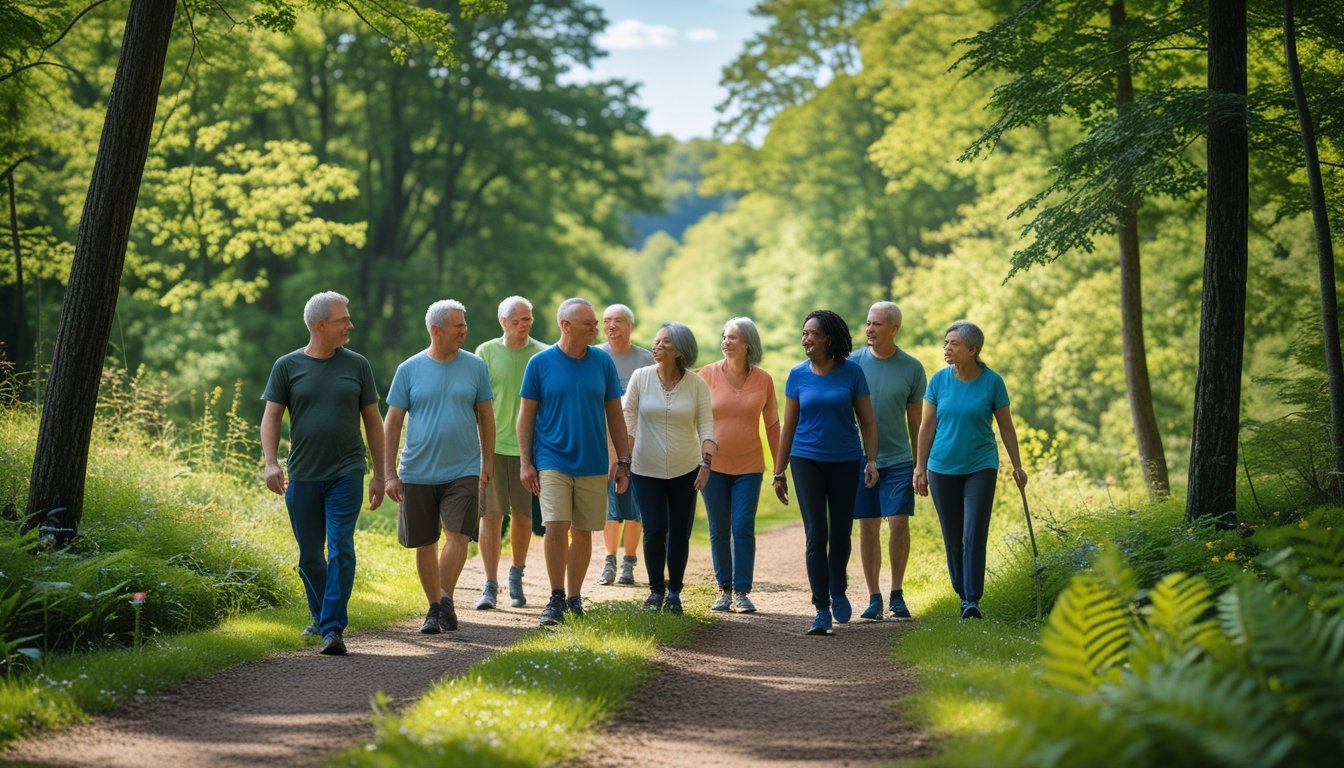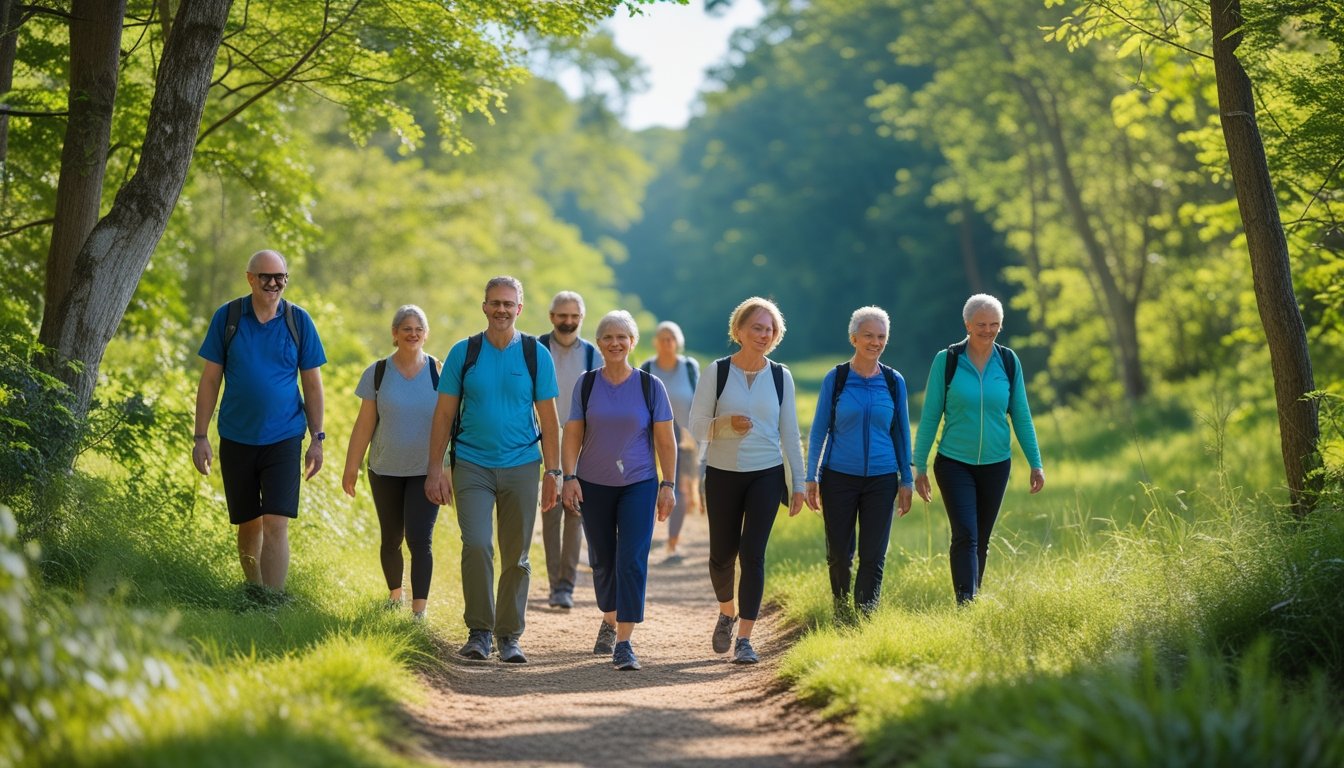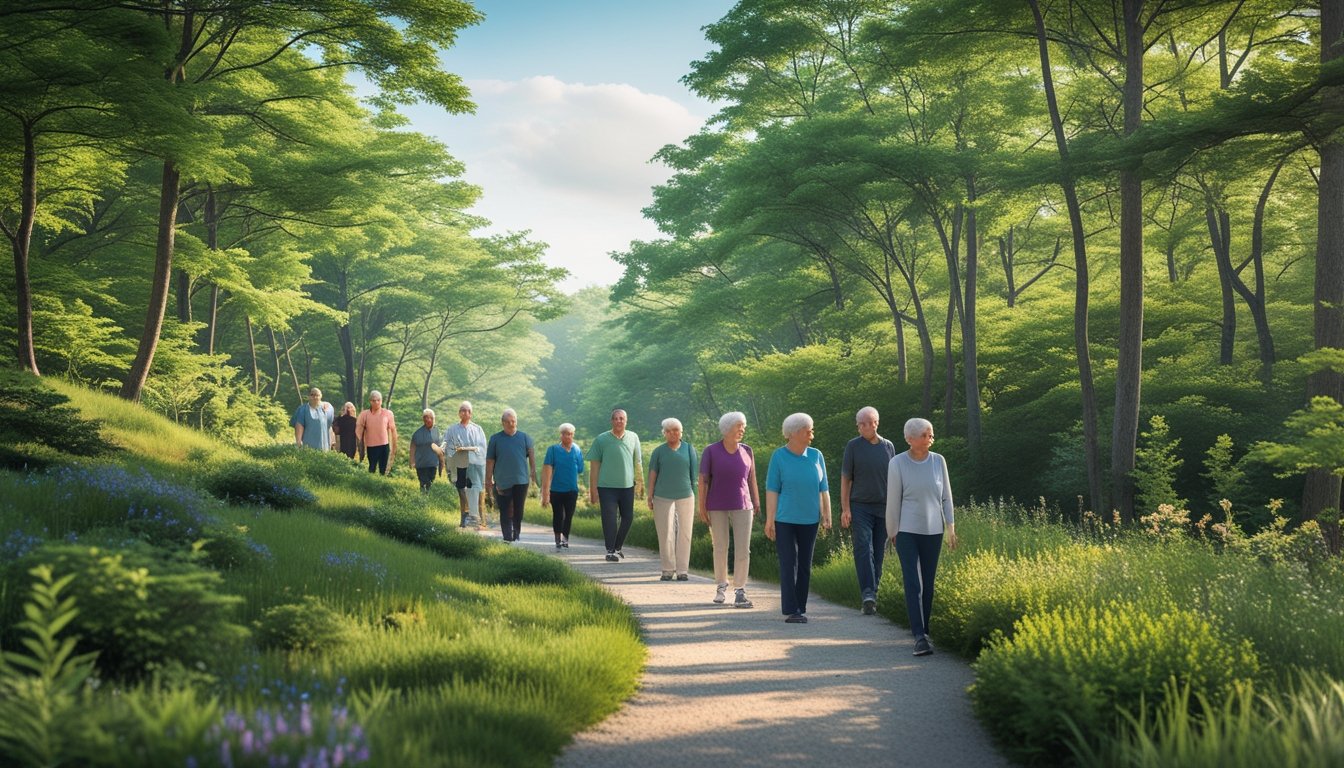Late updated: 27 Jun 2025 12:06
Written by: Ella Thompson
Integrating Nature Walks Into Recovery Programmes: Enhancing Healing Through Outdoor Therapy
Integrating nature walks into recovery programmes offers an empowering approach to mental and physical healing. By immersing ourselves in natural environments, we can experience a profound reduction in stress and anxiety, making these walks a valuable complement to conventional recovery strategies. Nature walks are not just a form of physical exercise; they nurture our mental and emotional well-being, promoting resilience and mindfulness.

As we engage with the sights and sounds of nature, there is a notable improvement in our mood and outlook on life. We believe that incorporating nature walks into recovery programmes can significantly enhance the journey to long-term recovery. Experience in recovery settings demonstrates that these activities can build a sense of community and support among participants, which is vital for maintaining motivation and progress.
Recovery is a multifaceted process, and nature walks uniquely support this journey by fostering holistic health improvements. Our commitment to integrating holistic practices ensures that individuals receive well-rounded support in their recovery, empowering them to maintain a positive trajectory.
Key Takeaways
- Nature walks enhance mental and emotional well-being.
- They promote resilience and community support in recovery.
- Integrating these walks offers holistic health benefits.
The Role of Nature Walks in Recovery Programmes
Nature walks can extensively benefit individuals in recovery programmes by boosting mental and physical well-being, serving as therapeutic outlets, and encouraging mindfulness and self-discovery. These walks also foster social connections and community engagement, enhancing the recovery experience.
Benefits for Mental and Physical Well-Being
Nature walks significantly contribute to our mental health by lowering stress levels and improving mood. Engaging with the natural environment reduces cortisol, commonly associated with stress, and promotes the release of feel-good hormones such as serotonin and endorphins. These effects contribute to enhanced mood and mental wellness.
On the physical side, nature walks improve cardiovascular health and strengthen the immune system by providing gentle, yet effective, outdoor exercise. This enhances overall physical well-being and supports the body's healing processes, proving highly beneficial for individuals in addiction recovery programmes.
Nature Walks as a Therapeutic Tool
Incorporating nature therapy such as walks into recovery programmes offers a holistic method of healing. We can consider nature walks a form of ecotherapy or wilderness therapy, where the therapeutic power of nature aids in treating emotional and mental issues. Walking in natural surroundings provides a sense of relief and calmness, reducing the intensity of withdrawal symptoms.
Moreover, these walks provide a structured activity within treatment programmes that promotes resilience and supports long-term sobriety. The act of walking outdoors becomes a meditative process, aligning mind and body toward a path of recovery.
Enhancing Mindfulness and Self-Discovery Outdoors
Mindfulness, a crucial aspect of recovery, is naturally elevated through nature walks. As we engage in these walks, we practice being present in the moment, fostering self-awareness and clarity. The simplicity of walking amidst nature encourages us to reflect and connect with our inner selves, aiding in self-discovery.
Journaling and outdoor meditation during these walks can enhance this experience, providing a platform for personal growth. This connection with nature enables us to better understand our thoughts and emotions, which is essential in maintaining mental clarity during the recovery process.
Fostering Social Connections and Community Engagement
Participating in group nature walks encourages social support and community bonds. These walks create opportunities for shared experiences, fostering a sense of belonging and strengthening support networks. Engaging in group activities like this can lead to forming lasting friendships and a reliable support system.
Additionally, walking as part of a group can promote community connection, making individuals feel more accepted and understood. This sense of engagement can be invaluable in overcoming feelings of isolation often experienced during addiction recovery, reinforcing the collective journey towards wellness.
Implementing Nature Walks in Recovery Strategies

Integrating nature walks into recovery programmes offers a dynamic approach to improving well-being. These activities can enhance emotional resilience and boost self-esteem while also improving cognitive function. We will explore the types of activities that can be included and practical considerations for implementation.
Types of Nature-Based Activities for Recovery
Incorporating a diverse range of activities is crucial to maximise engagement and therapeutic benefits. Nature walks, hiking, and forest bathing offer different levels of physical exertion and engagement with natural settings.
Forest bathing, derived from the Japanese practice of Shinrin-yoku, provides mindfulness opportunities. For those seeking more structure, horticultural therapy and gardening can encourage a sense of accomplishment. Such horticultural activities promote responsibility and connect individuals to natural cycles. By integrating these activities, recovery programmes can tailor experiences to meet diverse needs.
Building Emotional Resilience Through Outdoor Experiences
Outdoor pursuits can significantly bolster emotional resilience, aiding personal growth and emotional well-being. As we engage with nature, challenges such as uneven terrain or changing weather can foster adaptability.
Interaction with green spaces offers a unique way to develop coping mechanisms. In turn, this can enhance emotional growth, reducing stress and anxiety whilst providing a supportive environment for personal reflection. Our connection to nature encourages self-awareness and can improve emotional regulation, essential elements in the recovery journey.
Practical Considerations for Recovery Centres
Implementing nature walks at treatment centres requires strategic planning. Identifying nearby natural settings and green spaces for safe, consistent use is critical. Consideration must be given to accessibility, ensuring all participants can benefit from the activities.
Support systems should include trained guides or therapists experienced in nature-informed therapy. Developing structured schedules that integrate these activities into existing programmes provides coherence and maximises therapeutic outcomes. It's essential to tailor activities to the needs and preferences of participants, ensuring everyone can participate and benefit.
Boosting Cognitive Function and Self-Esteem
Nature walks can play a pivotal role in enhancing cognitive functions and self-esteem. Engaging the mind in a natural environment can improve concentration and memory. The sense of accomplishment from overcoming physical challenges or participating in nature activities contributes to building self-esteem.
Participants often experience increased confidence, affirming their progress in personal and recovery journeys. Adventure therapy, by engaging individuals in real-world challenges and problem-solving, fosters a sense of achievement. Embedding such experiences within recovery programmes can catalyse improvements in cognitive and emotional well-being, solidifying long-term success.
Frequently Asked Questions

Integrating nature walks into recovery programmes offers a holistic dimension. They aid in physical and emotional recovery by reducing stress, enhancing mood, and providing structured physical activity tailored to individual healing processes.
How can outdoor activities facilitate physical and emotional healing?
Outdoor activities, like nature walks, offer a dual benefit. Physically, they provide exercise that improves cardiovascular health and releases endorphins. Emotionally, the serenity of nature helps reduce anxiety and depression, promoting mindfulness that supports emotional well-being.
What are the therapeutic benefits of regular participation in nature walks for those recovering from illness?
Regular nature walks help manage stress and anxiety levels by providing a peaceful setting that lowers cortisol levels. They also encourage personal reflection and boost mood, which is particularly beneficial for those on a recovery journey, aiding sustained mental health improvements.
In what ways can environmental settings influence stress reduction and recovery processes?
Natural environments offer tranquillity, fostering relaxation and reducing stress markers. The sights and sounds of nature trigger calming responses in the body, which can enhance recovery outcomes by creating a conducive space for mental and physical healing.
What guidelines should practitioners follow when incorporating nature walks into patient recovery plans?
Practitioners should assess individual patient needs and tailor walks accordingly. It's crucial to consider physical limitations and ensure that activities are aligned with overall recovery goals. Safety and comfort should be prioritised to maximise therapeutic benefits.
Can nature walks effectively complement conventional rehabilitation therapies, and if so, how?
Nature walks can serve as a valuable adjunct to traditional therapies by providing a unique setting that supports recovery. They offer an experiential approach that complements cognitive and physical therapies, enhancing overall treatment efficacy and motivating continued participation.
How should the intensity and duration of nature walks be tailored to individual recovery goals?
Personalisation is key. The intensity and duration should be adjusted based on an individual’s physical capabilities and recovery benchmarks. Starting with shorter, less strenuous walks and gradually increasing them ensures that the activity remains beneficial and aligns with personal progress milestones.
